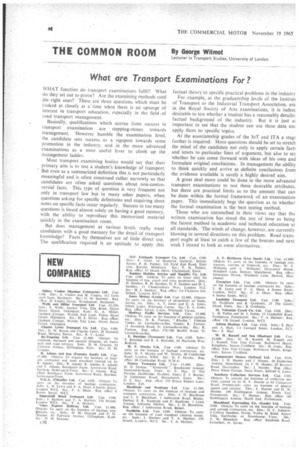What are Transport Examinations For ?
Page 90

If you've noticed an error in this article please click here to report it so we can fix it.
WHAT function do transport examinations fulfil? What do they set out to prove? Are the examining methods used the right ones? These are three questions which must be looked at closely at a-time when there is an upsurge of interest in transport education, especially in the field .of road transport management.
Basically, qualifications which accrue from success in transport examination are stepping-stones towards management. However humble the examination level, the candidate sees success as a signpost towards some promotion in the industry, and in the more advanced examinations as a most useful lever to climb up the management ladder.
Most transport -examining bodies would say that their primary aim is to test a student's knowledge of transport. But even as a summaiized definition this is not particularly meaningful and is often construed rather narrowly so that candidates are often asked questions about non-controversial facts. This type of question is very frequent not only in transport law but in many other papers, when questions asking for specific definitions and requiring short notes on specific facts occur regularly. Success in too many questions is based almost solely on having a good memory, with the ability to reproduce this memorized material quickly in the examination room.
But does management at various levels really want candidates with a good memory for the detail of transport knowledge? Facts by themselves are of little direct use, The qualification required is an aptitude to apply this
factual theory to specific practical problems in the industry For example, at the graduateship levels of the Institut( of Transport or the Industrial Transport Association, ant in the Royal Society of Arts examinations, it is indeec desirable to test whether a 'student has a reasonably detailec factual background of the industry. But it is just a! important to see that the student can use these data ant apply them to specific topics.
At the associateship grades of the IoT and ITA a stagc further is required. More questions should be set to stretch the mind of the candidate not only to apply certain fact and tenets to .particular lines of argument, but also to see whether he can come forward with ideas of his own and formulate original conclusions. In management the ability to think quickly and arrive at definite conclusions from the evidence available is surely a highly desired aim.
A great deal more could be done in the more advanced transport examinations to test these desirable attributes, but there are practical limits as to the amount that can be done within the formal framework of an examination paper. This immediately begs the question as to whether the formal examination is the best testing method.
Those who are entrenched in their views say that the written examination has stood the test of time as being the fairest method in academic and technical education at all standards. The winds of change, however, are currently blowing in several directions on this problem. Road transport ought at least to catch a few of the breezes and next week I intend to look at some alternatives.
















































































































































